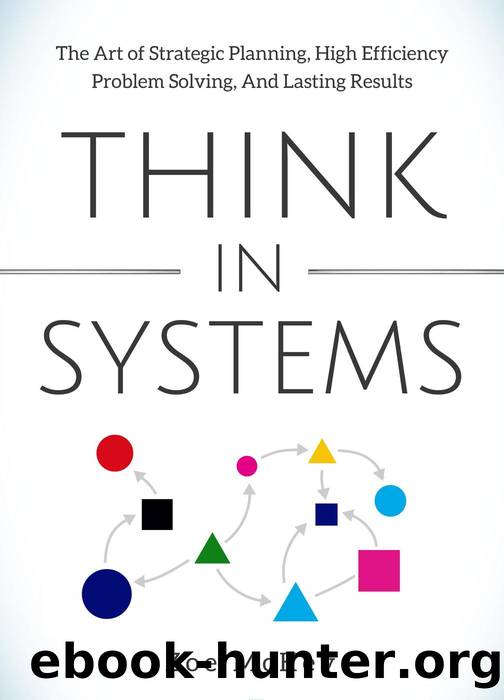Think in Systems by Zoe McKey

Author:Zoe McKey
Language: eng
Format: epub
Tags: systems thinker, rational thinking, holistic thinking, interdependence, thinking in systems
Publisher: Zoe McKey
Published: 2020-06-06T16:00:00+00:00
Start to adopt this way of looking at events and things slowly. Introduce it gradually to your work life and personal life.
Chapter 7 - Solving Everyday and Complex Problems with Systems Thinking
IN THE PREVIOUS CHAPTER, we learned that when solving a problem, we tend to look at the problem or the symptoms of the problem. What we actually need to focus on is the ecosystem that this problem exists in. Something like global warming canât just be thought of as the world getting warmer. The problem lives within everyoneâs homes, the cars we drive, and the pollution we are creating.
Systems thinking takes a problem and looks at it as a whole. Itâs a broader way to effectively problem-solve. Jay Forrester in his book The Fifth Discipline defines systems thinking as follows: âSystems thinking is a discipline for seeing wholes. It is a framework for seeing interrelationships rather than things, for seeing patterns of change rather than static âsnapshots.ââ
Instead of seeing the photo of what the problem is, we can look at the patterns and interactions which make up the problem itself. Like Albert Einstein said, âThe problems cannot be solved using the same level of thinking that created them.â Problems around us are often dependent on external factors, like with global warming. Instead of looking at global warming as rising temperatures, systems thinking allows us to see the interrelationships between human interference, laws of nature, chemistry and physics, and how they affect global warming.
The Approach of Systems Thinking
Everyone talks about analyzing problems, and the word âanalyzeâ literally means âto break into parts.â We talked about systems thinking using synthesis to study how elements interact with each other within a system and with other systems. Instead of breaking down a situation into smaller parts, systems thinking expands your vision to a big-picture view where the problem lies. While this is extremely effective for complex issues, it can also work well for solving everyday issues that you encounter. What can we use systems thinking for in our everyday lives?
- Any complex issue where multiple actors are involved to help them see the airplane view of the problem, not just their individual parts in it. For example, family quarrels, workplace disagreements, etc.
- Problems that donât seem to go away even though there were attempts to solve them.
- Problems with non-obvious solutions.
Download
This site does not store any files on its server. We only index and link to content provided by other sites. Please contact the content providers to delete copyright contents if any and email us, we'll remove relevant links or contents immediately.
Tools of Titans by Timothy Ferriss(8393)
Change Your Questions, Change Your Life by Marilee Adams(7780)
Deep Work by Cal Newport(7083)
Playing to Win_ How Strategy Really Works by A.G. Lafley & Roger L. Martin(6300)
Man-made Catastrophes and Risk Information Concealment by Dmitry Chernov & Didier Sornette(6019)
Big Magic: Creative Living Beyond Fear by Elizabeth Gilbert(5771)
Digital Minimalism by Cal Newport;(5764)
Ego Is the Enemy by Ryan Holiday(5445)
The Slight Edge by Jeff Olson(5417)
The Motivation Myth by Jeff Haden(5212)
The Laws of Human Nature by Robert Greene(5208)
Stone's Rules by Roger Stone(5087)
Tuesdays with Morrie by Mitch Albom(4783)
Eat That Frog! by Brian Tracy(4536)
Rising Strong by Brene Brown(4459)
Skin in the Game by Nassim Nicholas Taleb(4248)
The Money Culture by Michael Lewis(4207)
Bullshit Jobs by David Graeber(4190)
Skin in the Game: Hidden Asymmetries in Daily Life by Nassim Nicholas Taleb(4004)
